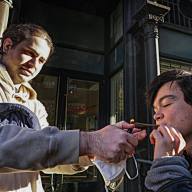 Attorney Eileen Connor, left, advises Rita Valladares on her student loan debt at the Financial District office of the New York Legal Assistance Group.
Attorney Eileen Connor, left, advises Rita Valladares on her student loan debt at the Financial District office of the New York Legal Assistance Group.
Rita Valladares bounced her toddler son in her lap and gestured at a piece of paper that had her name on it, listed next to the word “defendant.”
“When I see this, it’s just so disappointing, you know?” said Valladares, 23. “My sister’s 19, she wants to get an education; but she’s afraid of getting into this type of situation.”
The piece of paper in question had been sent to Valladares courtesy of Technical Career Institutes (TCI), a for-profit college she had attended for a few weeks in the fall of 2008 before dropping out, dissatisfied with the program. She had unwittinglybeenenrolled in remedial-level classes she didn’t need for her major, she said, andmaintained that she was told there would be no consequences for leaving when she did.
Three and a half years later the letter arrived, notifying her that she was being sued for $1,771.34 in unpaid tuition and fees.
Valladares, who also owes $2,000 to ASA College, which she also attended for a few weeks in 2009 — “That was the worst mistake I made,” she said — is one of hundreds of people who have sought assistance from the New York Legal Assistance Groupafter bad experiences with some of the city’s many for-profit degree programs.
There are dozens of these schools in New York City alone, their advertisements promising a brighter future plastered all over the subway. Recruiters regularly patrol Fulton Mall in Brooklyn and Grand Concourse in the Bronx, promising financial assistance and help with job placement after graduation.
But according to NYLAGDirector of Litigation Jane Greengold Stevens, such promises should not be taken on faith. Too often, she said, these schools prey on vulnerable members of society — low-income New Yorkers and immigrants — looking for a way to better themselves.
“One of the most important things to understand about the process is that when a person walks into one of these places, they walk out an hour later already fully enrolled,” Stevens said.
That initial meeting often involves some form of loan application, even for students with bad credit and limited means, she said. The loans are disbursed directly to the school.
“So what’s actually happening is students are coming out of the schools with burdensome loans and essentially no training,” Stevens said. “Many people end up going back to the very low-paying job they had before.”
Valladares’ mother, Maria, a Honduran immigrant, also attended TCI. She quit her housecleaning job to enroll full-time, studying to become a nursing assistant. She graduated with an associate’s degree but was unable to find a job after failing her CNA certification. She now works two low-paying jobs: as a cashier for Rite Aid and as a teacher’s assistant.
NYLAG provides free legal counsel to low-income New Yorkers, and is working as part of a coalition that includes the Neighborhood Economic Development Advocacy Projectto build a case against some of the worst-offending schools. The coalition is also seeking to convince the Department of Education to implement a massive stoppage of collections from people who have been “defrauded” by these schools.
The president of ASA, Alex Shchegol, sees it differently. No education system is perfect, he acknowledged, but emphasized the rigorous selection standards his schools sets for its teachers and ASA’s high graduation rate.
“I’m not a hundred percent aware what’s going on at other colleges,” Shchegol said. “Whether I’m aware of problems with many students, let me put it this way: I think there are more problems in the public sector.”
 An advertisement for ASA College is seen on the subway.
An advertisement for ASA College is seen on the subway.
The for-profit college industry is booming, with enrollment growing at a rate of 225 percent between the years of 1998 and 2008 — a significantly higher rate than the 31 percent growth across higher education as a whole during the same period of time.
Earlier this spring, the Department of Education announced that it would renew a push for controversial regulations on for-profit colleges. These regulations, known as “gainful employment,” would tighten underwriting standards for some student loans and protect graduates who are unable to get jobs with enough of a salary to pay back their loans.
Even if it that legislation is passed, it may not come soon enough for Valladares, who is now enrolled at Kingsborough Community College. She likes the program — she calls it a “real” college — but worries about her credit score, which has been affected by her legal woes with TCI and ASA.
“I was told if I keep having these problems with schools, I won’t be able to keep going to Kingsborough,” she said.
Follow Emily Johnson on Twitter @emilyjreports














